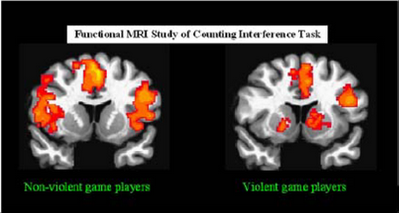Violent Video Games Affect Self Control
No Real Doubt Remains After MRI Study

---As reported in a November 29, 2006 InformationWeek article entitled Study: Violent Video Game Exposure Affects Self-Control by K.C. Jones, researchers at Indiana University School of Medicine used functional magnetic resonance imaging (fMRI) to measure brain activity of participants while they performed tasks measuring inhibition and concentration, immediately after playing video games. The researchers documented differences between those who played violent games and those who played non-violent games.
Those who played the violent game showed less activity in an area associated with executive functions such as planning, shifting, and controlling and directing thoughts and behavior, according to researchers. They showed more activity (brightly colored scans) in the amygdala, an area of the brain connected with emotional arousal.
The validity of the study is pretty solid – statistically, it’s compelling data, and the structure of the study is sound. The implications, of course, will be a long time in coming.
Suffice it to say, however, that we now have real-time, visible proof that exposure and immersion into violent video games has a spill-over effect on brain function. How much, for how long, we don’t know. We do know, however, that the brain is a very malleable and plastic thing, and it gets trained.
So if you’re wondering where the short attention span, irritability, or lack of emotional discipline in our children is coming from, maybe we’re one step closer to identifying a culprit.
When we allow our kids to get exposed to any content – through video games, television, or the Internet, we really have to be accountable for the impact it has on them. And the more of that content they absorb, the more impact it’s going to have.
Content comes in all forms now. We live in a media generation. So as parents, we’re called to be more aware, more vigilant. We have to supervise our kids, and modulate their exposure. It’s more work now than ever, because there are more sources of stimulus, and – let’s be honest – they’re much more potent now than ever before.
So while exposure to too much Space Invaders might not warp a mind, murdering a prostitute in Grand Theft Auto, or killing Germans as a sniper in Call of Duty, just might have a lasting effect. And networked games, where players interact with one another, create a level of social re-enforcement that adds to the potency of the experience.
It doesn’t take a rocket-scientist to understand the correlation. It may take more studies like this one to round out the theories, but the biochemistry is undeniable.
So what are we going to do about it?
Do your kids overdose on video games? Do they use networked games, and do they interact with friends and/or strangers in their simulated worlds? How much do you know about this part of their lives? Share your experiences.


5 Comments:
Does anyone know the percent of people that play violent video games I will come back to see.
By Anonymous, at March 20, 2007 11:06 AM
Anonymous, at March 20, 2007 11:06 AM
Good info
By Anonymous, at March 20, 2007 11:06 AM
Anonymous, at March 20, 2007 11:06 AM
I don't have any handy information on what percentage of folks play violent video games. But I would guess that it's probably 100% of those teenage males who play video game at all.
From www.gamespot.com, of the top 10 games sold in January and February, four were violent first-person shooters. Of the rest, two were for the new Nintendo WII controller. Madden NFL, a perennial favorite, was still in the top 10. On a positive note, guitar Hero II (an "air guitar" video game -- sounds fun) was also in the top 10.
I see hope...
By John Carosella, at March 26, 2007 5:23 PM
John Carosella, at March 26, 2007 5:23 PM
correlation is not causation
By Anonymous, at September 24, 2015 8:40 AM
Anonymous, at September 24, 2015 8:40 AM
this is like saying you're terrible at writing papers because I think there is correlation based on this example.
By Anonymous, at February 13, 2021 8:44 AM
Anonymous, at February 13, 2021 8:44 AM
Post a Comment
<< Home